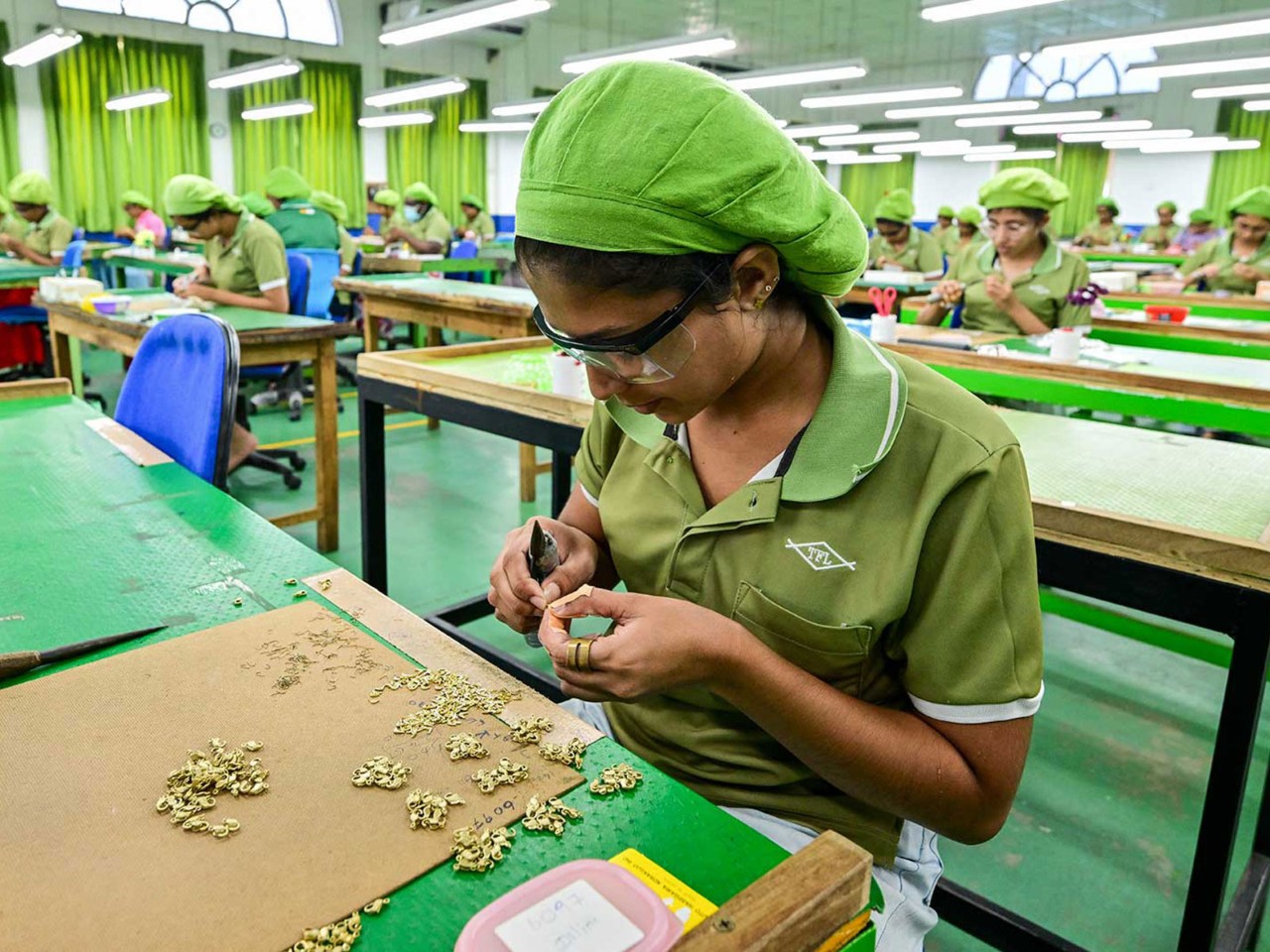
Sri Lanka’s apparel sector, a key component in the country’s export basket, has long been criticised for its environmental impact, from high carbon emissions to excessive water usage. Now, as, businesses start to address this, they also stand to benefit as a result.
‘The fashion industry contributes around 10% of global carbon emissions annually,’ says Talal Rafi, director at EY Sri Lanka. ‘Sustainable business practices are essential for Sri Lankan apparel exporters as countries globally increase regulations based on their climate goals. Focusing on sustainable practices early can help give Sri Lanka a competitive advantage.’
‘We’re exploring new materials and processes that reduce environmental impact’
Embedding sustainability
A number of leading manufacturers are working to embed sustainability in their businesses, among them MAS Holdings, which in 2020 launched its Plan for Change 2025, with a target of 25.2% absolute reduction in emissions by 2025.
MAS’s strategy focuses on the concept of the circular economy: keeping resources in use for as long as possible. To this end, the company is investing in innovation hubs and collaborating with global partners. ‘We’re exploring new materials and processes that reduce environmental impact, including biodegradable fabrics and smart textiles,’ explains Vivek Ramchandani, director of group business development.
Restoring biodiversity is also central to MAS’s strategy. ‘We aim to restore biodiversity in areas 100 times the size of our operational footprint, particularly through forest restoration and invasive species removal in sensitive ecosystems,’ says Dhanujie Jayapala, MAS’s general manager of environmental sustainability.
‘Water is critical for us, and our systems are designed to ensure efficient use’
All these efforts are driven by a commitment to transparency and compliance with stringent EU and US regulations. ‘We proactively meet current and upcoming regulatory requirements, reporting our progress through Global Reporting Initiative-compliant impact reports and disclosures,’ Jayapala adds.
Water focus
At Hayleys Fabric, meanwhile, sustainability is integrated deeply into its operations through its environmental, social and governance (ESG) framework, and the business hopes to achieve net-zero emissions by 2050. Its Eco Stretch textile design was recognised at sports apparel platform ISPO’s Textrends Spring/Summer 2026 event.
As a signatory to the UN’s CEO Water Mandate, the company has implemented advanced water recycling systems, dramatically reducing consumption.
‘Water is critical for us, and our systems are designed to ensure efficient use,’ the company explains. Its efforts also extend to its use of renewable energy, with a 75% increase over the past year, driven by investments in solar power and biomass boilers.
Moose Clothing Company is also aligning with the shift through initiatives like upcycling, ethical sourcing and sustainable packaging. ‘We’re taking a significant step to reduce waste and minimise our environmental footprint,’ says CEO Hasib Omar.
Empowering people
While environmental sustainability is crucial, businesses are recognising that this goes hand in hand with social responsibility. At MAS Holdings, the ‘Lives Changed for Good’ pillar of its Plan for Change focuses on women’s empowerment, flexible working conditions, healthy lifestyles and supporting employees with disabilities.
‘A thriving apparel industry requires a strong commitment to worker welfare’
‘Our work on women’s empowerment addresses needs across multiple levels, from training and development to health and entrepreneurial support,’ explains Amanthi Perera, general manager of social sustainability at MAS.
Moose Clothing Company is also committed to social responsibility, ensuring fair wages and competitive prices for suppliers. ‘We believe that a thriving apparel industry requires a strong commitment to worker welfare and community engagement,’ says Omar.
Hayleys Fabric, too, recognises the importance of social sustainability. The business offers a wide range of employee benefits, including comprehensive health and wellness programmes. The company is also actively preserving nine acres of wetland, providing portable water to eradicate chronic kidney disease in a remote village, offering scholarships, running medical camps and supporting underprivileged schools.
Ebony Holdings, another key player in Sri Lanka’s apparel sector, is similarly committed to worker welfare and community development. ‘We offer a diverse range of benefits to our employees, including healthcare access, mental health support and skill development programmes,’ explains chairman Rasmi Raheem. ‘We are also deeply engaged with local communities, working with them to upcycle waste materials, transforming what would otherwise be discarded into useful products and creating employment opportunities in the process.’
Looking to the future
Going forward, ‘sustainability, digitalisation, mechanisation and advanced materials will be the key trends,’ says Ramchandani. He believes that embracing the circular economy, integrating artificial intelligence and the Internet of Things for smart manufacturing, as well as developing eco-friendly, performance-enhancing textiles, will be essential for the future.
‘Automation and AI-driven processes shorten production cycles’
Like MAS, Hayleys Fabric is also focused on smart manufacturing. ‘We are investing heavily in recycling and upcycled fabrics, as well as exploring organic and regenerative cotton farming,’ the company states.
Meanwhile, Ebony Holdings, too, is investing in digital transformation. ‘We’re investing in automation and AI-driven processes to shorten production cycles and offer customisable solutions,’ says Raheem. Data-driven decision-making, supported by advanced software such as SAP and Power BI, have also supported the business, while digitisation of the supply chain ensures transparency and real-time tracking at every stage of production.
The apparel sector will also benefit from national policies that support growth. Ramchandani points out that a supportive environment, including incentives, tax benefits and trade agreements, will help Sri Lanka maintain its competitive edge. Additionally, agile supply chains and a highly skilled workforce will be crucial for creating a regional hub for services such as design, innovation, and modernisation.
More information
Read our careers article for advice on working in the fashion industry.



